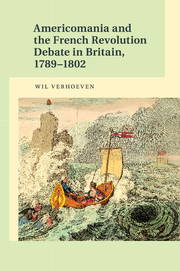
- Cited by 10
-
Cited byCrossref Citations
This Book has been cited by the following publications. This list is generated based on data provided by Crossref.
Cutterham, Tom 2016. The unrevolutionary 1790s. Global Discourse, Vol. 6, Issue. 1-2, p. 178.
Epstein, James 2019. Political Trials in an Age of Revolutions. p. 109.
Hertler, Steven C. Figueredo, Aurelio José and Peñaherrera-Aguirre, Mateo 2020. Multilevel Selection. p. 137.
Adamik, Verena 2020. In Search of the Utopian States of America. p. 49.
Adamik, Verena 2020. In Search of the Utopian States of America. p. 15.
White, Daniel E. 2020. The Case of the Nocturnal Amanuenses: New Evidence in the Wat Tyler Affair. Modern Philology, Vol. 118, Issue. 2, p. 277.
Alpaugh, Micah 2021. Friends of Freedom.
Adamik, Verena 2023. Auf der Suche nach den Utopischen Staaten von Amerika. p. 19.
Adamik, Verena 2023. Auf der Suche nach den Utopischen Staaten von Amerika. p. 57.
Earley, Ben 2024. Thucydides and the British reaction to the French Revolution. European Review of History: Revue européenne d'histoire, p. 1.
- Publisher:
- Cambridge University Press
- Online publication date:
- December 2013
- Print publication year:
- 2013
- Online ISBN:
- 9781139628716




